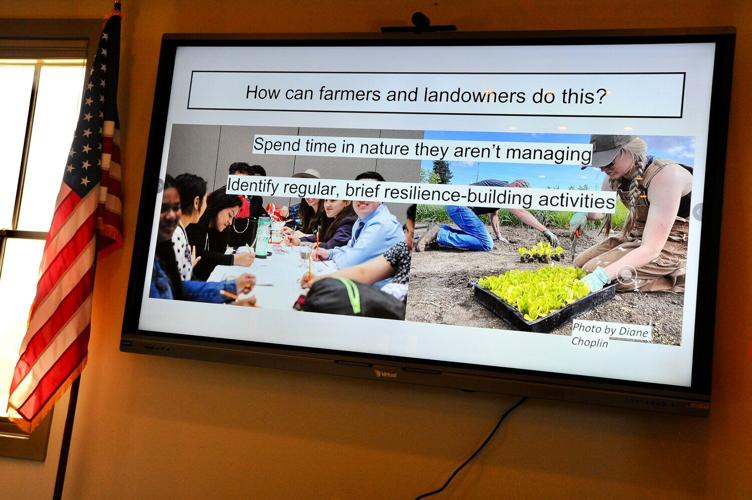Asked to share their personal and professional experiences with "ecological stress," local land managers who attended a climate grief workshop at the Taos Soil and Water Conservation District Tuesday (Feb. 4) had no trouble identifying their emotions, coming up with anecdotes and suggesting ways to cope.
Attendees reported feeling anger, sadness and feelings of powerlessness due to drought and water shortages, for example, or seemingly insurmountable noxious weeds and other phenomenon exacerbated by climate change.
Gerald Romero, district manager of the Tierra y Montes Soil and Water Conservation District headquartered in Las Vegas, survived the 2022 Calf Canyon–Hermits Peak Wildfire. He recalled the sadness he felt when his father had to give up his livestock "because there's no longer water." He grew emotional recounting how he and his father had to empty three freezers full of home-raised food that had spoiled during the wildfire when electricity was cut.
"That's only the second time in my life I've seen my dad cry," he said.
J.R. Logan, forest and watershed health program manager for Taos County, said he hasn't seen the "creek that runs through our little acre of land since my kids were [aged] 2 and 4.
"That was one of the great joys of fatherhood, watching the boys run up there and play in the water," Logan said. "It breaks my heart to see the drought."
Maud Powell, associate professor of practice at Oregon State University, led the workshop at the conservation district headquarters, as well as an evening session for the general public at the Juan I. Gonzales Agricultural Center that drew 90 attendees.
Taos County Extension Agent Will Jaremko-Wright said the evening event was "the biggest crowd I've ever had at an extension service event. It speaks to the powerful nature of the topic."
According to a 2022 Pew Research poll, 25 percent of adults in the Western U.S. reported their communities had been impacted by severe weather or floods, while 62 percent reported long periods of unusually hot weather. Sixty-eight percent reported experiencing drought or water shortages, and 59 percent were impacted by wildfire.
"When we think about grief, it's really hard to lose a loved one or a pet that we've raised since they were a puppy or a kitten — but it is a discrete death, right? It's one organism dying," Powell said. "The climate, the ecological situation, is ongoing. There's no resolution. We continue to lose things. We know we'll lose more. And so what happens is that many of us actually just want to tune out. We want to numb out."
For the agricultural community, there are already risks of depression and even suicide due to the unpredictable nature of farming and ranching, and the thin margins on which most small producers get by.
With climate change adding to the uncertainty, "We're seeing more fear and sadness, anxiety and more risk of substance abuse and increased risk of suicide," Powell said. "It's going to be harder for farmers and landowners, because we have this front-row view to the changes [and] our livelihoods can be affected."
Farmers and ranchers, Powell said, are already driven by what's known as "the agrarian imperative," which "compels farmers to work incredibly hard to endure unusual pain and hardship and take uncommon risks."
"I've noticed working with so many farmers that there's almost this inexplicable drive to produce food beyond what sometimes seems reasonable," she said. "Also the research shows that farmers are less likely to seek out mental health support."
Several people shared what they do to cope with climate grief.
Jack Carpenter, a forester with the Taos Soil and Water Conservation District, said he reads and learns about past climate-related events, like the 1930s Dust Bowl, to keep things in perspective, while others said they take a walk in the woods. Jaremko-Wright reminded people it's important to "Go hang out with your friends. That's the time you get to vent."
Gary Maestas, assistant farm manager at the New Mexico State University Alcalde Center, told the Taos News after the event it's important for individuals to "find your happy place."
"Climate change has affected all of us in one way or another, and it causes stressors in our daily lives that can lead to sickness in our own bodies," he said. "Find your peace is my recommendation."
For farmer- and rancher-specific support resources, call or text the AgriStress Helpline at 833-897-2474. Regardless of profession, anyone in need of support can dial 988 to reach the Suicide & Crisis Lifeline.

















(0) comments
Welcome to the discussion.
Log In
All comment authors MUST use their real names. Posts that cannot be ascribed to a real person
will not be moderated.
Keep it Clean. Please avoid obscene, vulgar, lewd, racist or sexually-oriented language.
PLEASE TURN OFF YOUR CAPS LOCK.
Don't Threaten. Threats of harming another person will not be tolerated.
Be Truthful. Don't knowingly lie about anyone or anything.
Be Nice. No racism, sexism or any sort of -ism that is degrading to another person.
Be Proactive. Use the 'Report' link on each comment to let us know of abusive posts.
Share with Us. We'd love to hear eyewitness accounts, the history behind an article.